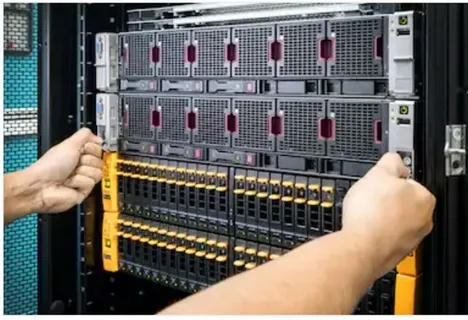How to Configure NAS for Secure Data Access in Coworking Spaces?
Businesses / Posted 7 months ago by Network Attach Storage / 57 views
Introduction
In the era of flexible workspaces and collaborative environments, coworking spaces have become increasingly popular. These spaces often host a diverse range of businesses and professionals who require reliable and secure access to data. Network Attached Storage (NAS) has emerged as an ideal solution for managing and securing data in such environments. Properly configuring NAS systems is crucial to ensure secure data access and protect sensitive information. This article explores how to effectively configure NAS for secure data access in coworking spaces, focusing on best practices and essential features.
Understanding the Role of NAS in Coworking Spaces
Network Attached Storage (NAS) provides centralized data storage that is accessible over a network. In coworking spaces, where multiple users and businesses share the same infrastructure, NAS systems offer a unified solution for managing data access and ensuring security. By implementing a well-configured NAS system, coworking spaces can facilitate efficient data management while safeguarding against unauthorized access and data breaches.
Setting Up User Access Controls
One of the fundamental steps in configuring NAS for secure data access is establishing robust user access controls. In a coworking space, it’s essential to set up distinct user accounts with varying levels of access based on individual roles and requirements. This approach ensures that users only have access to the data and resources necessary for their work, minimizing the risk of unauthorized access. Implementing role-based access controls (RBAC) allows for fine-grained permission settings, enabling administrators to manage who can view, modify, or share specific files and folders.
Implementing Strong Authentication Methods
Strong authentication methods are vital for securing NAS systems in coworking spaces. By using multi-factor authentication (MFA), organizations can add an extra layer of security beyond traditional username and password combinations. MFA requires users to provide additional verification, such as a code sent to their mobile device or biometric data, making it significantly harder for unauthorized individuals to gain access. Ensuring that MFA is enabled for all user accounts enhances the overall security of the NAS system and protects against potential breaches.
Encrypting Data for Enhanced Security
Data encryption is a critical component of NAS configuration for secure access. Encryption converts data into a format that is unreadable without the proper decryption key. Implementing encryption at both the file and disk levels ensures that data stored on the NAS is protected from unauthorized access, even if physical security is compromised. In a coworking space, where multiple users might access the same storage infrastructure, encryption helps safeguard sensitive information from prying eyes and potential data breaches.
Regularly Updating and Patching NAS Systems
Maintaining the security of NAS systems involves regular updates and patches. NAS manufacturers frequently release firmware updates that address vulnerabilities and enhance system security. Keeping the NAS firmware up to date ensures that the system benefits from the latest security patches and improvements. Regularly checking for updates and applying them promptly helps protect the NAS from emerging threats and reduces the risk of exploitation by malicious actors.
Implementing Network Security Measures
In addition to configuring the NAS itself, network security measures play a crucial role in protecting data access in coworking spaces. Utilizing firewalls and intrusion detection systems (IDS) can help prevent unauthorized access and monitor network traffic for suspicious activity. Establishing a secure network infrastructure with strong encryption protocols, such as VPNs (Virtual Private Networks), ensures that data transmitted to and from the NAS remains protected. By incorporating these network security measures, coworking spaces can create a secure environment for NAS systems and safeguard data against potential threats.
Creating Regular Backup Procedures
Regular backups are essential for ensuring data integrity and availability in case of accidental loss or corruption. Configuring automated backup procedures for NAS systems ensures that data is consistently backed up at scheduled intervals. Implementing off-site or cloud-based backups provides an additional layer of protection, allowing for data recovery even in the event of a catastrophic failure or disaster. In a coworking space, where multiple users rely on shared data, having reliable backup procedures in place is crucial for maintaining business continuity and minimizing downtime.
Monitoring and Auditing Access Logs
Monitoring and auditing access logs are important practices for maintaining security in a coworking environment. NAS systems typically generate logs that record user access and activity. Regularly reviewing these logs helps identify any unusual or unauthorized access attempts, allowing administrators to take prompt action if necessary. Implementing automated alerting systems that notify administrators of suspicious activity further enhances security by enabling quick responses to potential threats.
Educating Users on Best Practices
Finally, educating users on best practices for data security is an essential aspect of configuring NAS systems. Providing training on how to securely access and manage data, recognize phishing attempts, and use strong passwords helps create a security-conscious culture within the coworking space. Encouraging users to follow established security protocols and report any security concerns contributes to maintaining a secure environment for everyone.
Conclusion
Configuring NAS for secure data access in coworking spaces involves a combination of user access controls, strong authentication, encryption, regular updates, network security, backups, monitoring, and user education. By implementing these practices, coworking spaces can ensure that their NAS systems provide reliable and secure data access, protecting sensitive information from unauthorized access and potential breaches. As the demand for flexible work environments continues to grow, effective NAS configuration remains a cornerstone of data security in shared workspaces.
- Listing ID: 25027

